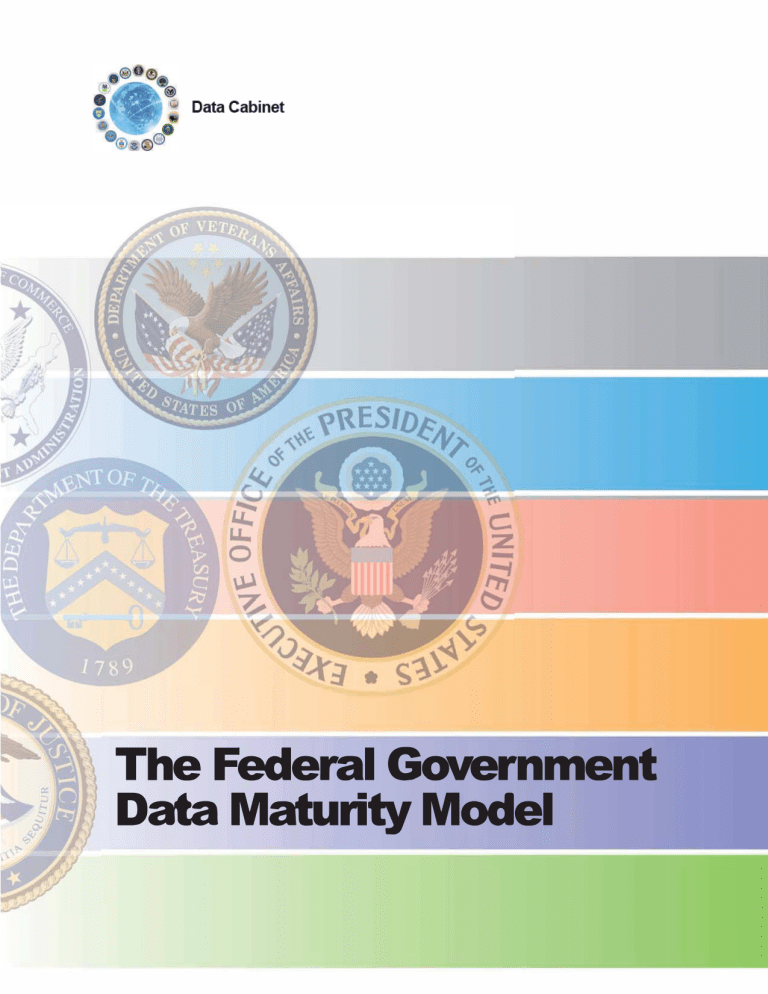
The Federal Government Data Maturity Model Analytics Capability C iii' Summary reports Descriptive analytics Data use is uncoordinated and ad-hoc. Quality issues limit usefulness Data use is by request Quality programs are nascent Data managed in silos. documentation sparse; standards not regularly applied Data managed in silos; some documentation exists; standards not regularly applied No dedicated personnel performing data duties Some siloed data teams; no clear career path for data personnel Data is stored in siloed systems; data are frequently copied to facilitate use Data are stored in siloed systems; some data can be programmatically accessed Loose affiliations of technical staff Bureau-level collaboration, data ownership and stewardship '<Cl) 'i iii Data Culture I s- 3� rf �� 3 UI 8 5. � Data Management I» .., G) ca fc 0� C el if Data Personnel �� r-· ii cB c5" C i1S1. I3: !!!. Systems/ Technology I» 0 ::::, ::::, I» 3:CC (D 3 � -· I» ::::, (D ::::, na I» - (Q Data Governance ,, - ::::,- er =::::S(DI» �! -· C. C el Low Capability Federal Government Data Maturity Model: The following document details the six lanes of the Federal Gov­ ernment Data Maturity Model, including each of the five milestones within the lanes. The six lanes are: Analytics Capability, Data Culture, Data Management, Data Personnel, Data Systems and Technology, and Data Governance. The power of the model is in its simplicity, therefore, this document provides more context and detail around the lanes and milestones so that concepts are well defined, allowing for a common language and understanding to be established among practitioners. Purpose The purpose of this model is threefold. First, this model helps agencies with a high-level assessment of current capabilities and supporting processes. The framework al­ lows agencies to easily understand their "current state" and helps users conceptualize where they want their organization to be in the long term. It then provides some practical steps for getting there. Second, this model helps with strategic communication between agency data professionals and agency leadership. It can also serve to communicate to the broader agency about the strategic direction of data improvement initiatives. Diagnostic analytics Predictive analytics Some data and analytics are routine and have quality programs supporting key assets High demand for data across agency. Drives decision making Data managed across the agency; documentation is unifonn; some standards are applied Data are managed with cross-functional applications in mind; documentation is unifonn; standards regular1y agJ>lied Cross.functional prescriptive analytics lnfar.egancy communities d I shar8 analy9as, practicas Data are managed considering agency-wide needs; documentation is unifonn; standards are unifonnly applied C" 0 i.o· en S" ::I UI ::I a, ::I C. Q) a. y, Data professionals integrated with subject matter experts Multidisciplinary teams solving agency mission and operational challenges Some common data systems; some data can be programmatically accessed Some common data systems; key data can be programmatically accessed; some common tools exist Cont common data systems; key data can be programmatically acca11ad; common tools ara in use across Agency�evel organization accountable for data governance Multi-agency advancement of data ownership and stewardship Agency level collaboration, data ownership and stewardship c. C 'i a )> ::I 8� )> 0 i C Q) ::I 6" C. C" :s:: 3 -·-· - UI !a � -· UI 0 Professional development path established for data personnel � iii ::I -· g Q) a' C 0 m- -t - ::I 5,. .., C ::0 � £:)::I" ci;' C -· a, C gen� d �CQ C ::I" C)� s. ��� (1) 3 -· . (1)3 � ;:i. t ::I (1) C. High Capability Finally, the model provides a common language and framework to help promulgate common solutions and best practices across federal agencies toward advancing data-driven decision making. This document contains helpful guidance within each of the lanes that address numerous organizational dynamics when creating organizational change. How to Use this Model It is important to note that the purpose of this model is not to provide a rigid or prescriptive "one size fits all" approach to improving data capabilities within federal agencies. Nor does it maintain that all agencies need to reach or complete all milestones within all lanes to achieve optimal data capabilities. It simply provides a framework of organized ideas and suggestions to help agencies consider what works best for them as they carve out a path to success. Outcome Measure The top lane of the model, ':A-nalytics Capability'' should be consid­ ered an outcome measure for capability. This lane provides a contin­ uum of demonstrated capability from the simplest summary reporting to the most complex prescriptive analytics requiring a vast amount of data and supporting processes. The other five lanes all help to support and enable greater capability, and are essential to achieving lasting change across an organization.

